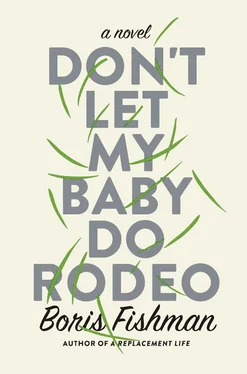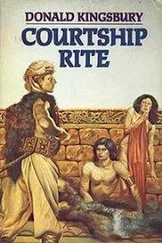She doesn’t recoil, and this restores some of his confidence. No matter what, he thinks, he will always be grateful to her for having elicited this . Even if she tells Dima, this can’t be taken away. Whatever Alex was beginning to sink into before he met Maya doesn’t matter because she’s pulled him out. That’s why he loves her. Yes, he loves her.
“I was wondering when you would finally. .” She trails off.
“I am finally. .” He repeats her words, because it is all he can do. She laughs. This laugh is the nicest thing ever to happen to him. The hip, the laugh, the sun — he feels ransomed. The day burns with a dull roar.
“I am leaving in three weeks,” she says with the resignation that was one of the first things Alex noticed about her. He envies her weariness, the certainty even if the certainty is in disappointment, at the same time as he wishes to destroy it, to replace it with delight. He has seen Maya express irony, and cynicism, and humor, but never delight.
“I thought you would say something about Dima,” he says.
“I am leaving in three weeks and something about Dima.”
“You don’t have to leave.”
“Do your parents have friends in the visa section?”
“Then let’s spend three weeks together.”
“You are charming, Alex. And I like you. But I am not going to break Dima’s heart for three weeks with you.”
“Would Dima’s heart break?” Alex says.
“You’re right,” she smiles. “But still.”
He ignores the sting of the rejection. The sting of — brazen, truth-telling Maya, too mindful of Dima’s feelings to hurt them. But what about Alex’s?
“Dima is not a Jew,” Alex says savagely.
She laughs and looks at the water. “It’s true, I would like to marry a Jew. But Dima and I are not going to get married.”
“But you and I can get married.”
His statement is so foolish that he snorts out a terrified laugh. Maya, however, does not laugh in return. Her amusement is now anger. The muddy water sparkles like soda around them. Maya turns and strides away. In this one way — he is a citizen, she is not — the discrepancy in their power is so implacable that Alex’s flaunting of it is heartless. The power of the powerful is tricky that way; truly, power is with the needy and meek. Unless Alex means it, of course. Does he mean it? Alex’s head swells with the possibility that he means it. It is the first great achievement of his life — his and his own. He hurtles after Maya, imploring her to stop.
She stops. The corner of one eye fills with a tear, which makes him notice that she is wearing eyeliner. He has never noticed makeup on her; it’s one of the things he’s loved about her face without knowing it. Her face is not beautiful — he is proud of himself for not requiring beauty — but it does not need makeup. It is Maya’s face — that is all that is necessary of it. But she has put on eyeliner because she was meeting him and she wanted to appear attractive to him; otherwise, why do women apply eyeliner? And as she pushes past him again, it is this detail — eyeliner! — that fills him with the recklessness to leap onto one of the benches lining the stone wall that borders the water. He has never done such a thing, and he will never do it again.
He has to find his balance because the planks are loose. It is quite a worn-out pedestal from which to make the announcement he is about to make, the bench’s original paint flaking under his boat shoes. Alex shouts to the walkers of Battery Park that he has just asked that girl to marry him . At these words, Maya stops walking. And she can’t make up her mind. I want her to know what you think. Maya spins around and regards Alex with an incredulity bordering on contempt.
The walkers have stopped. Explanatory whispers go around — that boy, that girl. The observers form a half dome now, encircling Maya and Alex at the stone wall that borders the Hudson. Maya Shulman is not too shy to break through and walk away, but she does not walk away. She stands and stares at Alex Rubin. She watches Alex leap off the bench and stride toward her. As he does, the members of the semicircle around them forget themselves; their mouths crinkle in wonder; in expectation, they rustle like the lindens about them. Alex walks up to Maya and places his hands on her back, touching surely now. The back of her dress is buttoned instead of zippered and his fingers graze Maya’s skin. It is unfamiliar skin; it is warm from the sun; he feels a birthmark. He wants to get to know this skin very closely. Then he places his lips on Maya’s. The low hum of the watchers erupts into shouts and applause; they have received the show they have stopped for. This is New York.
When Alex takes his lips from Maya’s, she wears the same expression of scornful disbelief that she wore in Battery Park three months before. This time the dress she wears is organdy and tulle. The groom’s mother bustles around the well-wishers and newlyweds trying to understand whether she feels relief or alarm, and casting worrying looks at the bride’s mother, the only Shulman to cross the ocean because there was money enough for only one ticket and the Shulmans would not take Eugene’s charity.
Maya, suddenly eligible to become an American citizen, looks at her mother, who wears a discouraging expression. It is Galina Shulman’s first visit to America, but a week of wandering around Manhattan — she has mystified and insulted Raisa by spending her days walking around Manhattan instead of kibbitzing with Raisa at Camp Rubin in south Brooklyn — has made her understand that it is not everywhere that a woman answers an offer of marriage while thinking of more than what she feels for the man. No American has to marry because her country has walked off a cliff, as Maya must, must, must now, faced with this opportunity — this poisonous, diabolical opportunity. Diabolical because now how will Maya know whether she said yes to the man or the country? Several months more might have made it clearer, but they did not have several months more. Her visa said June 10, 1992. And she refused to take a medical job. That was her daughter.
If Alex had not come upstairs the day of the hockey game, Maya would have ridden out her remaining months in America with Dima Niskevich, who would have kissed her on June 10 and wished her the best. Then she would have returned to Ukraine and settled back in with her parents. Maya is doing the most practical thing Maya can do for herself. Only that, for the first time in Galina’s life, the best thing for Maya has diverged from the best thing for Galina. This is what happens when you let your child leave home. Toward Alex, toward all the Rubins, Galina feels gratitude mixed with hatred. This, as much as her desire to get to know the city that will be her daughter’s new home, accounts for why she leaves the Rubins’ every morning to take the train to Manhattan. This makes Raisa only more solicitous, which sends Galina into the morning only more quickly.
Under the wedding canopy, Maya watches her mother’s marble-faced stare from afar. She does not know her mother to fear, but her mother looks fearful, which makes Maya fearful in turn. For what both women know, but Alex does not, is that his wife — Alex constantly refers to Maya as his spouse even before they’ve been wed — will apply herself to this marriage with the constancy of an animal. Alex was wrong to imagine Maya as capricious and fickle. What Galina Shulman knows is that insubordination is only another kind of fidelity, and stays fastened as truly. And this is what she fears.
Maya turns back to Alex. Maya thought trying to cook Ukrainian food for Americans was unlikely, but this ; this is something; the two of them together younger than a single one of their parents. She thinks: Alex, you are like a flower that grows on a barren ledge of rock face five thousand feet up. Down on the ground, where there is water and the elements are more kind, you don’t thrive, you become disoriented. You grow where there is not supposed to be growth. You survive there. As the rabbi talks, she makes a prayer of her own — guiltily; to a God she has ignored until now. Let us be tenacious together. Let us be constant in a mutual way. Then she makes herself look once more at the rabbi, and mouths after him the authorized Hebrew words that sound like cries from a pack animal.
Читать дальше












